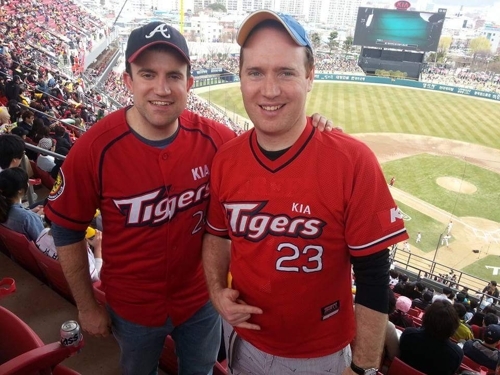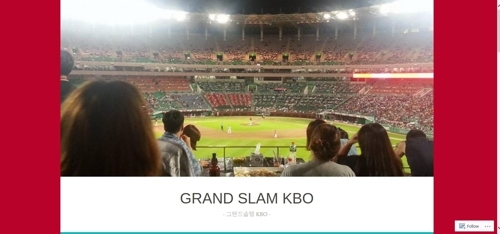Two unlikely friends, one from Ireland and the other from the United States, have teamed up to launch a website dedicated to -- of all things -- South Korean professional baseball.
They even record a weekly podcast on the Korea Baseball Organization, discussing a wide range of topics related to the league with knowledge and expertise that would put casual Korean fans to shame. The two have also managed to interview former and current KBO players, and Andrew Farrell and Brian Richards say they're just beginning.
Farrell is an Irishman in Seoul, and you can hear it in his accent when he talks. While his native country is far from being a baseball hotbed -- Ireland and baseball don't exactly go together like peas and carrots -- Farrell still fell in love with the game after arriving in Gwangju, some 330 kilometers south of Seoul, as an English teacher in 2009.
 |
Brian Richards (L) and Andrew Farrell pose for a picture during a Korea Baseball Organization game at Gwangju-Kia Champions Field in Gwangju, in this undated photo provided by Farrell. (Yonhap) |
The city is home of the KBO club Kia Tigers, and it's also where Farrell met Richards, who grew up in Tennessee as a fan of the Atlanta Braves. Unlike Farrell, Richards didn't need to take any crash course on baseball rules. But when he went to his first game in Gwangju, Richards, who sat next to the stage for cheerleaders, quickly became fascinated with an entirely new baseball experience -- a raucous stadium atmosphere with constant chanting and cheering, vastly different from anything he'd experienced back home.
The love of the Tigers may seem to be the only common link between the two, but it was strong enough to bring them together for a website called Grand Slam KBO (https://grandslamkbo.com).
They set up the site last November but made some tweaks before getting it ready for a more formal launch before the start of the 2017 KBO season.
The site itself was more of Farrell's idea, and he said he saw "a good niche."
"We thought there was an opportunity to have an English site on Korean baseball," Farrell said in an interview Monday. "The main thing was to bring the KBO players to an English-speaking audience. We see the players on TV but we never really get to hear them. We wanted to let players tell their own stories."
Richards said running the website this year is giving himself and Farrell "a chance to get experience and build connections."
"The sites (on Korean baseball) that are generally available in English are kind of old and not very informative," Richards said. "The idea of podcast got floated around because there just wasn't one. We thought there could be a market for it."
 |
Andrew Farrell (L) and Brian Richards record an episode of their weekly podcast on the Korea Baseball Organization for their Grand Slam KBO website in Seoul on July 17, 2017, in his photo provided by Richards. (Yonhap) |
The site draws dozens of visitors per day, and certain sections are in need of more material. But the one feature that sticks out is the podcast.
Richards, the resident technician who edits podcasts, and Farrell, a former journalism student with some sports media experience, have recorded 16 episodes so far. They brought in English-speaking fans of the KBO, both homegrown and foreign, as guests in earlier episodes. For more recent ones, they've spoken to former KBO pitcher Shane Youman, current pitcher Henry Sosa, and ex-star of their favorite KBO team, Brett Pill.
"We'd like to try to get at least one player from each team," Richards said. "It doesn't have to be foreign players. It'd be pretty cool to get those perspectives and get players' stories."
Farrell said he wanted to invite Chris Oxspring and Brandon Knight, two former KBO pitchers still in the country as coaches for their former clubs, the Lotte Giants and Nexen Heroes. Trey Hillman, the American manager for the SK Wyverns, is on the wish list, too. They'd also like to speak to some Korean players, though language may be an issue.
When Farrell first started going to KBO games in Gwangju, getting baseball lingo down was an issue for him. Farrell admitted he knew "nothing about baseball" at first. He said he "embarrassed myself" asking so many questions, including why a team wasn't batting in the bottom of the ninth when it held a lead. It also took him a while to understand why a foul ball with two strikes wouldn't count as a third strike.
Today, he's the one explaining to friends why teams with a lead don't have to bat in the bottom ninth.
He recalled he only began attending the Tigers' games because Gwangju presented few other forms of entertainment on weekends, and going to the ballpark was "a really good way to meet people." And it didn't hurt that Farrell arrived in the city in 2009, in the midst of the Tigers' championship season.
Farrell now has fond memories of those days, when the Tigers were still playing at Mudeung Stadium, home for their first 32 seasons before Gwangju-Kia Champions Field opened in 2014.
"The stadium was small and dingy but there was something really beautiful about Mudeung," he said. "Baseball had always been known as America's game. But the Koreans were really into it."
Farrell now doesn't have to worry about figuring out the rules. He just enjoys the tension in the air whenever he goes to games, as if there were a championship at stake smack in the middle of the regular season.
"There's a real sense of occasion when you go to Jamsil Stadium on a Saturday or Sunday this time of the season," Farrell said of the Seoul-based home of two KBO clubs, the Doosan Bears and LG Twins. "Every game just seems to mean so much to people who are around you. There's always tomorrow but you just don't get that feeling sometimes (from the fans)."
 |
This captured image shows the landing page of the website Grand Slam KBO run by Seoul-based baseball fans Andrew Farrell and Brian Richards. (Yonhap) |
Richards agreed that there's much "intensity" for each game, and how the stadiums are set up here also contributes to that end.
"In the States, stadiums are so big it's really easy to be so far away from the game, and it can be hard just to follow it," he said. "Even in big stadiums in Korea, you're kind of right in it. There's a stronger connection. Even if you're not chanting, you're still in the game more than in America."
Both Richards and Farrell teach English, but while Farrell has the standard, 9-to-5 shift, Richards works from 12:30 p.m. to 8:30 p.m.
He said he'd like to have more free time during weekday evenings so he could attend more KBO games. Farrell doesn't have the same problem, and he'd like to make the most of the time on his hand.
"I am trying to make it to a game a week," he said. "I just want to spend more time watching baseball and get a feel for the games where the Tigers aren't playing. (It'll give me) more things to talk about (on podcasts)." (Yonhap)






![[Weekender] Korea's traditional sauce culture gains global recognition](http://res.heraldm.com/phpwas/restmb_idxmake.php?idx=644&simg=/content/image/2024/11/21/20241121050153_0.jpg)



